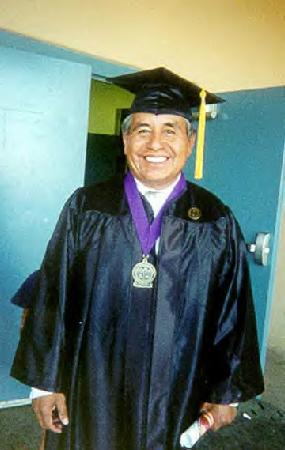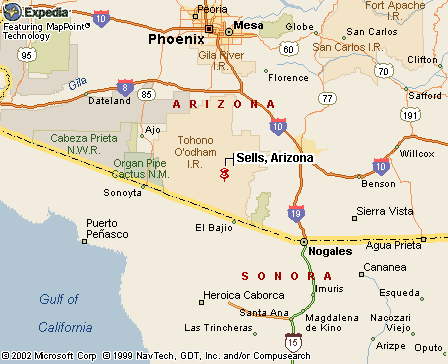|
|
Canku Ota |
|
|
(Many Paths) |
||
|
An Online Newsletter Celebrating Native America |
||
|
July 14, 2001 - Issue 40 |
||
|
|
||
|
O'odham Celebrate First Graduation |
||
|
by Brenda Norrell Indian Country Today Staff-June 27, 2001 |
||
|
photo of Edward Manuel by Brenda Norrell |
 SELLS, AZ - Standing proudly in her graduation cap and gown, Rebecca Antone
said she will continue her education and hopes to inspire other young teenage mothers to pursue their education
and dreams. SELLS, AZ - Standing proudly in her graduation cap and gown, Rebecca Antone
said she will continue her education and hopes to inspire other young teenage mothers to pursue their education
and dreams."Just don't give up. I know how hard it can be," said Antone, who became a mother at 14. Antone was among the first 28 graduates of Tohono O'odham Community College. With her associate of arts degree in hand she plans to attend the University of Arizona's school of education. "It's an accomplishment," she said shaking hands with hundreds of visitors after the commencement ceremony at Thomas Segundo Hall. Inspired by the growth of the community college the nation began two years ago, graduate Delon Pintor said, "It's their first effort. They're taking a big step." Standing alongside her were Gary Antone, electrical graduate, and Preston Juan receiving his GED. Other graduates received associate degrees in arts, applied science and general studies and diplomas in management information systems, facility maintenance and heavy equipment. Leann Garcia completed her bachelor's degree in education from the University of Arizona Project Native Program. The O'odham National Anthem was sung in tribute to the graduates. The Big Fields Dance Group sang traditional songs and Tohono O'odham Nation Veterans posted colors. "We can accomplish many things in this world," said Danny Lopez, who offered a spiritual blessing and honor song. "This is just the beginning." Spiritual elder Joseph Enos blessed graduates with water and prayer to the Four Directions. "Water is very important, very sacred," Enos said. "We need to go back to having a deep respect for food, for water." With the college swelling from its first 80 students to an enrollment of 200, Tohono O'odham Chairman Edward Manuel said O'odham could now pursue their dreams without having to leave their families behind. "It's hard if you have a family," he said of the drive to the nearest college in Tucson. "This is the first graduating class. It was a dream and now it is a reality." Manuel said the local community college would help O'odham retain their traditions and culture while receiving an education. "In order for the nation to become self-sufficient and determined, it must start with the individual. Get a degree, get a profession, get a skill and apply it anywhere in the world," Manuel said in an interview. But, he added, most O'odham pursuing careers elsewhere eventually come back home. At some point they say, "I'm going home." During the ceremony, Angie Listo, vice president of student services, recognized all O'odham college graduates in the audience. She also recalled the "one stop shopping" when the community college opened its doors with all college services in one room. "In that one stop shopping was the president's office, administration, academics and financial aid," she said, with thanks to founding President Richard Duran who is retiring. "We've come a long way Dr. Duran, from four employees to 40." Duran took a two-year leave of absence from Pima Community College to lead formation of the college. After a nationwide search, Robert Martin, former president of Haskell Indian Nations University in Kansas, was hired to head the college. Martin said he hopes to expand the college with centers in each of its 11 districts. The two-year college, funded by revenues from the nation's Desert Diamond Casino, is seeking accreditation. It operates in conjunction with Pima County Community College District. "Over twenty years ago members of the Tohono O'odham Nation dreamed of having their own college," Duran said, congratulating students. "Today, you reflect that dream." "You are the first to be recognized for your academic achievements under the banner of Tohono O'odham Community College. There will be more to follow." The graduates are Rebecca Antone, Andrea Dabdoub, Gary Quinn, Claire Bennet-Vega, Anita Salcido, Velita Acuna, Julian Escalante, Gertrude Lopez, Lucinda Antone, Phyliss Enos, Juanita Miguel, Juanita Quesada, Arlene Vnito, Gary Antone, Arnold Antone, John Johnson, Belinda Antone, Eddy Archaleta, Cynthia Enriquez, Joshua Espuma, Preston Juan, Durell Martinez, Jeidi Mata, Denise Montana, Duran Ortiz, Denise Quesada, Loren Silas, Rochelle Williams and Leann Garcia. |
|
|
|
THE TOHONO O'ODHAM INDIANS |
|
The O'odham Today |
|
|
||
|
|
||
| Canku Ota is a free Newsletter celebrating Native America, its traditions and accomplishments . We do not provide subscriber or visitor names to anyone. Some articles presented in Canku Ota may contain copyright material. We have received appropriate permissions for republishing any articles. Material appearing here is distributed without profit or monetary gain to those who have expressed an interest. This is in accordance with Title 17 U.S.C. section 107. | ||
|
Canku Ota is a copyright © 2000, 2001 of Vicki Lockard and Paul Barry. |
||
|
|
|
|
|
The "Canku Ota - A Newsletter Celebrating Native America" web site and its design is the |
||
|
Copyright © 1999, 2000, 2001 of Paul C. Barry. |
||
|
All Rights Reserved. |
||

